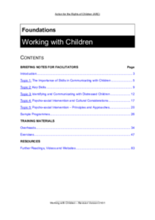It is a common mistake to assume that children (from age of about 6 and over) are too young to be aware of what is going on around them or too young to be adversely affected by dangerous or distressing experiences. Communicating with children and adolescents, for a variety of purposes, can be difficult and demand skills significantly different from those used when communicating with adults.
The ability to communicate effectively with children is hugely important whether for the purposes of imparting or gaining information, enabling the child to communicate his or her concerns, or in protecting and assisting the child. The provision of accurate and truthful information can be empowering to children and facilitates their involvement in making appropriate decisions and choices. It is doubtful that the best interests of any particular child can be determined if it is not possible to effectively communicate directly with him/her.
This resource pack offers an introduction to the skills of communicating with children and examines strategies for promoting the well-being of children affected by conflict. It addresses the following six key concepts:
1. Communicating with children is a core skill for some personnel working with refugee and displaced populations. Those who regularly work with children will need in-depth specialised training in this field.
2. Communicating effectively with children requires specific skills some of which are distinctively different from those involved in communicating with adults.
3. Inter-personal interaction between adults and children needs to be conducted in a way that is sensitive to cultural norms.
4. Communicating with distressed children requires particular skills and personal qualities.
5. A detailed understanding of cultural factors is essential in planning programmes to facilitate children’s psycho-social recovery from distressing experiences.
6. There are some key principles which can guide the process of programme planning in respect of enhancing the psycho-social well-being of children.
This resource pack is intended to provide an introduction to the skills of working effectively with children: it does not aim to provide comprehensive training. It is strongly recommended that personnel who have a regular need to communicate with children, and particularly those who regularly work with distressed children should seek more specialised training in this field.
©Action for the Rights of Children

